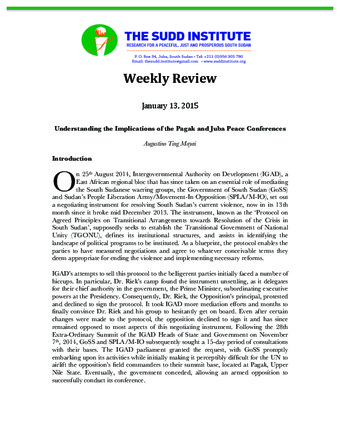Understanding the Implications of the Pagak and Juba Peace Conferences
Publication Summary
On 25th August 2014, Intergovernmental Authority on Development (IGAD), a East African regional bloc that has since taken on an essential role of mediating the South Sudanese warring groups, the Government of South Sudan (GoSS) and Sudan’s People Liberation Army/Movement-In Opposition (SPLA/M-IO), set out a negotiating instrument for resolving South Sudan’s current violence, now in its 13th month since it broke mid December 2013. The instrument, known as the ‘Protocol on Agreed Principles on Transitional Arrangements towards Resolution of the Crisis in South Sudan’, supposedly seeks to establish the Transitional Government of National Unity (TGONU), defines its institutional structures, and assists in identifying the landscape of political programs to be instituted. As a blueprint, the protocol enables the parties to have measured negotiations and agree to whatever conceivable terms they deem appropriate for ending the violence and implementing necessary reforms.
IGAD’s attempts to sell this protocol to the belligerent parties initially faced a number of hiccups. In particular, Dr. Riek’s camp found the instrument unsettling, as it delegates for their chief authority in the government, the Prime Minister, subordinating executive powers at the Presidency. Consequently, Dr. Riek, the Opposition’s principal, protested and declined to sign the protocol. It took IGAD more mediation efforts and months to finally convince Dr. Riek and his group to get on board. Even after certain changes were made to the protocol, the opposition declined to sign it and has since remained opposed to most aspects of this negotiating instrument. Following the 28th Extra-Ordinary Summit of the IGAD Heads of State and Government on November 7th, 2014, GoSS and SPLA/M-IO subsequently sought a 15-day period of consultations with their bases. The IGAD parliament granted the request, with GoSS promptly embarking upon its activities while initially making it perceptibly difficult for the UN to airlift the opposition’s field commanders to their summit base, located at Pagak, Upper Nile State. Eventually, the government conceded, allowing an armed opposition to successfully conduct its conference.
The government and the opposition concluded their consultations on November 24 and December 10, respectively. Both parties published their resolutions, with the opposition presenting what is arguably more comprehensive, although the bulk of its demands are not pragmatically appealing. Unlike the government whose resolutions center chiefly on government structures, president/prime minister’s executive powers, and the system of governance, the opposition attempted to address a wide range of crucial themes such as institutionalism, security, economy, justice and accountability, social accountability, and diplomatic relations. Even more appealing GoSS and the opposition express the need to work for peace in the country, considering certain conditions are met. Specifically, the opposition sees marked understanding on power sharing, presence of foreign troops, federalism, reforms, and the security arrangements during the transitional period as central to resolving the current conflict.
This analysis gives a detailed review of these resolutions in light of what they constitute in terms of timely attainment of peace in South Sudan. We show that little do the parties agree on a significant portion of the protocol. Given prevailing wide gaps between the two parties with respect to what they are expected to agree on and actively work toward, we are concerned that peace remains a distant dream for the South Sudanese. The rest of the review discusses the nuances of the resolutions, party by party, and proposes policy instructions. Emphasis is also placed upon areas of significance where the parties, either jointly or individually, appear deficient.
Augustino Ting Mayai's Biography
Augustino Ting Mayai is the former Managing Director of the Sudd Institute. He is a founding Research Director of the same institution, serving in this capacity for a decade. He holds a Ph.D. in Sociology, with concentrations on demography and development from the University of Wisconsin-Madison. He currently studies how state effectiveness affects child health outcomes in South Sudan and Ethiopia. Dr. Mayai has written extensively on South Sudan’s current affairs. August is the current Chair (Statistician General) of the National Bureau of Statistics, Government of South Sudan.

